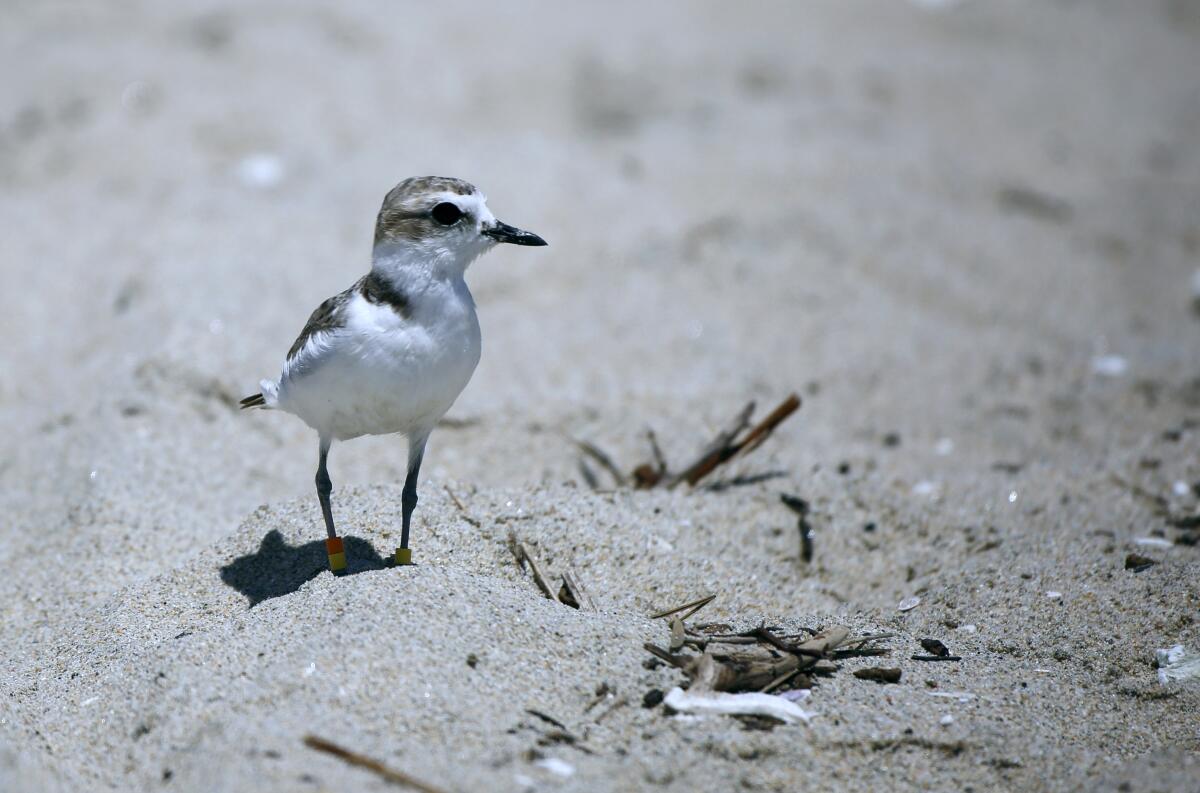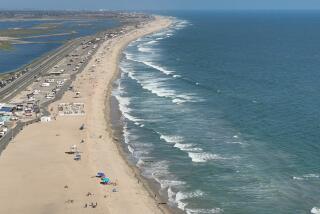Unleashed dogs near Santa Ana River mouth threaten at-risk birds. Humans are partly to blame

Near the mouth of the Santa Ana River, between Newport Beach and Huntington State Beach, lies the habitat of two at-risk bird species whose survival is threatened by jumping, splashing, barking dogs.
But local authorities may also be partly to blame for the increased risk to the birds by failing to strictly enforce the rules about dog activity near the habitat, according to environmentalists.
The California least tern, an endangered species, and the western snowy plover, a threatened species, nest near the mouth of the river and rely on it to survive. Of the almost 2,400 dogs that were observed on the beach in 2022, about 70% were off their leash, which threatens the bird habitat, according to a recent report by Orange County Coastkeeper, a nonprofit clean water organization.
The unleashed dogs are chasing birds or splashing around in areas where they usually feed, said Ray Hiemstra, associate director of policy and projects for Orange County Coastkeeper.
For the least terns, right next to the mouth of the Santa Ana River is their primary nesting place in this area, and when theyâre nesting they need a lot of food to survive, Hiemstra said.
âTheyâre not like our pets or something,â he said. âThereâs not just abundant food lying around. Theyâre always living on the edge. So anything that makes life harder for them ⦠all of that takes away from their ability to either forage and gather food, or it burns up their energy reserves that they have.â
After her rescue dog, Buddy, bit someone, Michelle Madden tapped bad-dog experts for help. Their advice made the situation worse, so Madden had to find another solution.
Activists called for the threatened birds to be protected in 2018 after people were seen using the area near the habitat as a de facto dog beach.
The California least terns nest in fenced-in areas near the mouth of the river. Being close to the river and ocean also allows them to fish for their young and teach them to fly.
The snowy plovers nest in mini-enclosures in the area. They stay by the shore to eat kelp, vegetation and invertebrates in the sand.
The least tern population has grown over the years, but they will need to be managed in colonies for a long time, said Scott Thomas, conservation vice chair for the Sea and Sage Audubon Society, which is the Orange County chapter of the National Audubon Society.
Thomas said the least terns have an innate fear of predators such as dogs, and that being chased by them reinforces that fear.
An Audubon Society report calls for tens of thousands of miles of new power lines to support solar and wind energy.
Because of the ternsâ fear, he added, there is a pattern that is now seen among them: They fish in the morning, bring their young out, teach them to fly and then leave once they see dogs running around.
Whether a dog is leashed or not, itâs the same to the bird, he said.
The least terns have exceptional eyesight, and just sensing the dogs from a distance can cause them to expend a lot of energy protecting their young during the nesting season, said Catherine Steinberg, 2024 director of the Sea and Sage Audubon Society.
âA lot of different species need the area, and when dogs are here, they canât use it,â she said.
The jurisdiction of the area around the birdsâ habitat is shared by several agencies, with rules and enforcement levels that vary by agency.
The area around the riverâs mouth is posted with signs stating where dogs and people arenât allowed. Signs also warn that the area is a habitat for the plover and the least tern.
Trish Bauer and her family officially adopted a 12-year-old German shepherd named Cooper exactly a year after she lost her baby, Millie, to a stillborn birth.
Steinberg said she hasnât seen dog activity decrease in the couple of years since the signs were erected.
Hiemstra said that because of the different rules and levels of enforcement, people are getting mixed messages.
For the record:
8:35 a.m. Aug. 1, 2023An earlier version of this article stated that dogs were allowed on Newport Beach only from 10 a.m. to 4:30 p.m. Dogs are not allowed on the beach during those hours.
At the Santa Ana River itself, people and dogs are not allowed in the channel. The Orange County Flood Control District is responsible for the river. The area west of the river is Huntington State Beach, where dogs are not allowed on the sand. The area east of the river is Newport Beach, where dogs are not allowed on the beach between 10 a.m. and 4:30 p.m. Before and after that time, dogs are allowed only while on a leash.
However, Hiemstra said, the varying enforcement allows people to disregard the rules at times. On the state beach side, he said, he has seen authorities give out tickets, but fewer tickets are issued in other areas.
According to the report by Orange County Coastkeeper, law enforcement showed up more than 300 times during the groupâs 1,275 surveys in the area, and no citations were observed. Still, the survey noted that warnings were given to dog owners on the Newport Beach side.
The Bird Buddy uses artificial intelligence to identify my backyard birds and an app to share them online. Does that make me a villain? Itâs complicated.
If someone has a dog on the sand at Huntington State Beach, usually an employee will notify an officer who will let the visitor know dogs are prohibited and that they have to go back to the pavement, according to a park aide.
At Newport Beach, officers patrol the beach when they can between their service calls and other responsibilities, with at least one proactive patrol check per day, said Nick Ott, an animal control officer with the Newport Beach Police Department. Officers also go out to the beach when they receive calls about any violations, he added.
Ott said officers try to mix what time they patrol the beach, which can affect when other people or groups see them. He said heâs had situations where even though heâs been patrolling every day for a week, there are people who say they have brought their dogs out everyday that week, meeting him for the first time.
Steinberg said sheâs never seen anyone cited for allowing their dog to frolic in the water. She added that she would like to see more enforcement of the ordinances already in place.
Hiemstra said he is calling on owners to keep their dogs on a leash and comply with other rules, making it safer for people and better for the birds.
âWe just need to be respectful and share the beach,â he said. âNot just among ourselves, but with wildlife too.â
More to Read
Sign up for Essential California
The most important California stories and recommendations in your inbox every morning.
You may occasionally receive promotional content from the Los Angeles Times.















